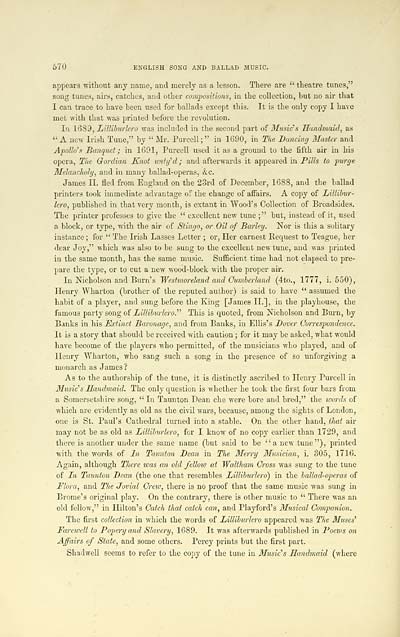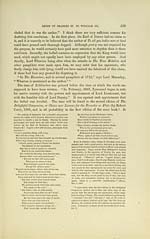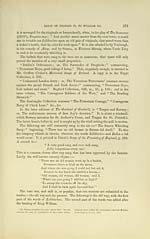Glen Collection of printed music > Printed text > Popular music of the olden time > Volume 2
(194) Page 570
Download files
Complete book:
Individual page:
Thumbnail gallery: Grid view | List view

570 ENGLISH SONG AND BALLAD MUSIC.
appears without any name, and merely as a lesson. There are " theatre tunes,"
song tunes, airs, catches, and other compositions, in the collection, but no air that
I can trace to have been used for ballads except this. It is the only copy I have
met with that was printed before the revolution.
In 1689, Lilliburlero was included in the second part of Music's Handmaid, as
" A new Irish Tune," by " Mr. Purcell ; " in 1690, in The Dancing Master and
Apollo's Banquet ; in 1691, Purcell used it as a ground to the fifth air in his
opera, The Grordian Knot unty'd; and afterwards it appeared in Pills to purge
Melancholy, and in many ballad-operas, &c.
James II. fled from England on the 23rd of December, 1688, and the ballad
printers took immediate advantage of the change of affairs. A copy of Lillibur-
lero, published in that very month, is extant in Wood's Collection of Broadsides.
The printer professes to give the " excellent new tune ;" but, instead of it, used
a block, or type, with the air of Stingo, or Oil of Barley. Nor is this a solitary
instance ; for " The Irish Lasses Letter ; or, Her earnest Request to Teague, her
dear Joy," which was also to be sung to the excellent new tune, and was printed
in the same month, has the same music. Suflicient time had not elapsed to pre-
pare the type, or to cut a new wood-block with the proper air.
In Nicholson and Burn's Westmoreland and Cumberland (4to., 1777, i. 550),
Henry Wharton (brother of the reputed author) is said to have " assumed the
habit of a player, and sung before the King [James II.], in the playhouse, the
famous party song of Lilliburlero." This is quoted, from Nicholson and Burn, by
Banks in his Extinct Baronage, and from Banks, in Ellis's Dover Correspondence.
It is a story that should be received with caution ; for it may be asked, what would
have become of the players who permitted, of the musicians who played, and of
Henry Wharton, who sang such a song in the presence of so unforgiving a
monarch as James ?
As to the authorship of the tune, it is distinctly ascribed to Henry Purcell in
Music's Handmaid. The only question is whether he took the first four bars from
a Somersetshire song, " In Taunton Dean che were bore and bred," the ivords of
which are evidently as old as the civil wars, because, among the sights of London,
one is St. Paul's Cathedral turned into a stable. On the other hand, that air
may not be as old as Lilliburlero, for I know of no copy earlier than 1729, and
there is another under the same name (but said to be "a new tune"), printed
with the words of In Taunton Dean in The Merry Musician, i. 305, 1716.
Again, although There was an old fellow at Waltham Cross was sung to the tune
of In Taunton Dean (the one that resembles Lilliburlero) in the ballad-operas of
Flora, and The Jovial Creiv, there is no proof that the same music was sung in
Brome's original play. On the contrary, there is other music to " There was an
old fellow," in Hilton's Catch that catch can, and Playford's Musical Companion.
The first collection in which the words of Lilliburlero appeared was The Muses'
Farewell to Popery and Slavery, 1689. It was afterwards published in Poems on
Affairs of State, and some others. Percy prints but the first part.
Shadwell seems to refer to the copy of the tune in Music's Handmaid (where
appears without any name, and merely as a lesson. There are " theatre tunes,"
song tunes, airs, catches, and other compositions, in the collection, but no air that
I can trace to have been used for ballads except this. It is the only copy I have
met with that was printed before the revolution.
In 1689, Lilliburlero was included in the second part of Music's Handmaid, as
" A new Irish Tune," by " Mr. Purcell ; " in 1690, in The Dancing Master and
Apollo's Banquet ; in 1691, Purcell used it as a ground to the fifth air in his
opera, The Grordian Knot unty'd; and afterwards it appeared in Pills to purge
Melancholy, and in many ballad-operas, &c.
James II. fled from England on the 23rd of December, 1688, and the ballad
printers took immediate advantage of the change of affairs. A copy of Lillibur-
lero, published in that very month, is extant in Wood's Collection of Broadsides.
The printer professes to give the " excellent new tune ;" but, instead of it, used
a block, or type, with the air of Stingo, or Oil of Barley. Nor is this a solitary
instance ; for " The Irish Lasses Letter ; or, Her earnest Request to Teague, her
dear Joy," which was also to be sung to the excellent new tune, and was printed
in the same month, has the same music. Suflicient time had not elapsed to pre-
pare the type, or to cut a new wood-block with the proper air.
In Nicholson and Burn's Westmoreland and Cumberland (4to., 1777, i. 550),
Henry Wharton (brother of the reputed author) is said to have " assumed the
habit of a player, and sung before the King [James II.], in the playhouse, the
famous party song of Lilliburlero." This is quoted, from Nicholson and Burn, by
Banks in his Extinct Baronage, and from Banks, in Ellis's Dover Correspondence.
It is a story that should be received with caution ; for it may be asked, what would
have become of the players who permitted, of the musicians who played, and of
Henry Wharton, who sang such a song in the presence of so unforgiving a
monarch as James ?
As to the authorship of the tune, it is distinctly ascribed to Henry Purcell in
Music's Handmaid. The only question is whether he took the first four bars from
a Somersetshire song, " In Taunton Dean che were bore and bred," the ivords of
which are evidently as old as the civil wars, because, among the sights of London,
one is St. Paul's Cathedral turned into a stable. On the other hand, that air
may not be as old as Lilliburlero, for I know of no copy earlier than 1729, and
there is another under the same name (but said to be "a new tune"), printed
with the words of In Taunton Dean in The Merry Musician, i. 305, 1716.
Again, although There was an old fellow at Waltham Cross was sung to the tune
of In Taunton Dean (the one that resembles Lilliburlero) in the ballad-operas of
Flora, and The Jovial Creiv, there is no proof that the same music was sung in
Brome's original play. On the contrary, there is other music to " There was an
old fellow," in Hilton's Catch that catch can, and Playford's Musical Companion.
The first collection in which the words of Lilliburlero appeared was The Muses'
Farewell to Popery and Slavery, 1689. It was afterwards published in Poems on
Affairs of State, and some others. Percy prints but the first part.
Shadwell seems to refer to the copy of the tune in Music's Handmaid (where
Set display mode to: Large image | Transcription
Images and transcriptions on this page, including medium image downloads, may be used under the Creative Commons Attribution 4.0 International Licence unless otherwise stated. ![]()
| Special collections of printed music > Glen Collection of printed music > Printed text > Popular music of the olden time > Volume 2 > (194) Page 570 |
|---|
| Permanent URL | https://digital.nls.uk/91364322 |
|---|
| Shelfmark | Glen.254a |
|---|---|
| Additional NLS resources: | |
| Attribution and copyright: |
|
| Description | Scottish songs and music of the 18th and early 19th centuries, including music for the Highland bagpipe. These are selected items from the collection of John Glen (1833 to 1904). Also includes a few manuscripts, some treatises, and other books on the subject. |
|---|
| Description | The Glen Collection and the Inglis Collection represent mainly 18th and 19th century Scottish music, including Scottish songs. The collections of Berlioz and Verdi collected by bibliographer Cecil Hopkinson contain contemporary and later editions of the works of the two composers Berlioz and Verdi. |
|---|

